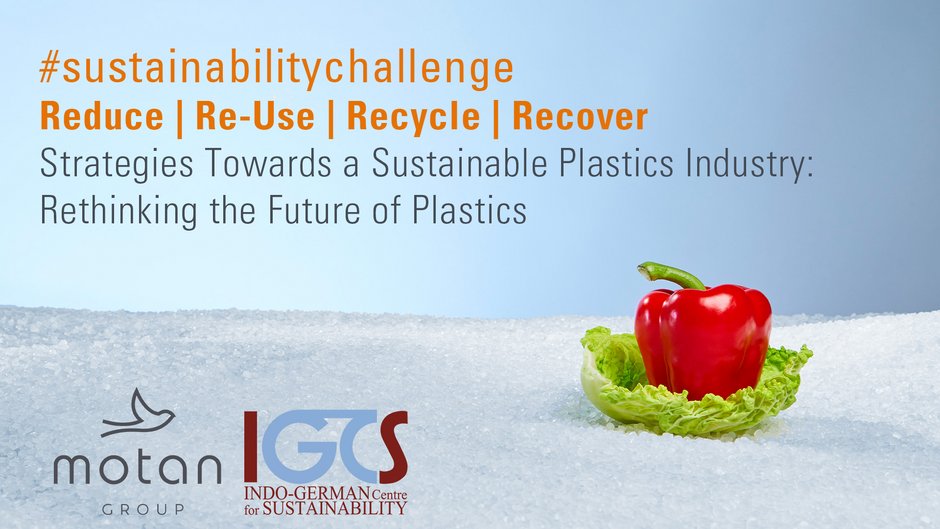Workshop: Rethinking the future of plastics

How can we rethink the way we deal, live and work with plastics? In December 2022, international students of various disciplines from Indian and German academic institutions dealt with this contemporary and multi-faceted topic. The digital workshop initiated by motan and the Indo-German Centre for Sustainability (IGCS) under the hashtag #sustainabilitychallenge took place for the second time. The aim of this interdisciplinary format is also to identify young researchers and to initiate research and cooperation in the field of plastics and the circular economy. To this end, keynote speeches by international industry experts showed the young scientists the complex challenges of plastics technology.
Over two days, the students, selected on the basis of their academic and practical experience, focused entirely on the topic of plastics and environmental protection. Three high-ranking lecturers from India and Germany each gave keynote speeches on current issues and strategies. Prof. Ansgar Jaeger (TH Würzburg-Schweinfurt) evaluated established waste management systems in Germany and Europe, Dr. Alexander Kronimus (PlasticsEurope Germany) presented the aspects of the "Circular EconomyPLUS" required for a holistic and sustainable system change, Dr. Prasad Modak (Environmental Management Centre LLP) described the current situation and challenges in implementing a circular plastics economy in India, Prof. Indumathi M Nambi (Indian Institute of Technology Madras) focused on the contamination of groundwater, and Dr. Suryasarathi Bose (Indian Institute of Science Bangalore) showed the extent to which the new material class of vitrimers has a key role to play in the circular economy.
Valuable practical experience was contributed by everwave project manager Jacqueline Plaster. The Aachen-based startup is developing technologies to collect plastic waste from rivers to prevent it from entering the oceans. This includes AI-supported waste collection boats and floating river platforms. motan has been cooperating with everwave since the end of 2021 and, among other things, financed a conveyor belt for a waste sorting facility in the Cambodian capital of Phnom Penh. everwave's pursuit of long-term awareness of sustainability and environmental protection fits perfectly with motan's long-standing strategy of continuously developing processes and products and making them more sustainable.
Finally, in small groups, the students worked out creative approaches and innovative ideas on the four topics of plastic waste management, circular economy, alternatives to single-use plastics, and macro- and microplastics in the environment in an intercultural exchange. "By building bridges between different disciplines and practice, we achieve a holistic understanding that is crucial for sustainability," Sandra Füllsack, CEO of the motan Group, is convinced. "We benefit from the students' knowledge and want to encourage collaboration with them. With their innovative and sustainable ideas, the young talents can shape the future." This is innovation in action.
The IGCS
The IGCS is a German-Indian center that promotes interdisciplinary fundamental and applied research, teaching, training and information in various areas of sustainability. Engineering, environmental and social sciences cooperate in this environment. The center aims to provide innovative solutions in sustainable research through bilateral relations between India and Germany. The IGCS is coordinated by RWTH Aachen University and IIT Madras and funded by the German Academic Exchange Service (DAAD) under the program "A new Passage to India". The coordinators are Prof. Dr. Krishna Vasudevan at IIT Madras and Prof. Dr. Klaus Reicherter at RWTH Aachen University.
